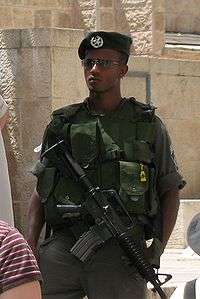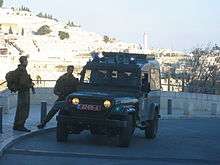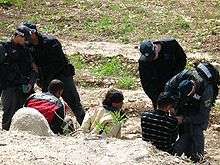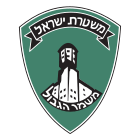Israel Border Police
| Israel Border Police | |
|---|---|
| Common name | Magav |
|
Emblem of Magav | |
| Agency overview | |
| Formed | 1953 |
| Preceding agency | Frontier Corps |
| Employees | ≈8,000 soldiers and officers |
| Legal personality | Governmental: Government agency |
| Jurisdictional structure | |
| National agency | Israel |
| Governing body | Israel Police |
| General nature | |
| Operational structure | |
| Website | |
| www.police.gov.il/English_contentPage.aspx | |
The Israel Border Police (Hebrew: מִשְׁמַר הַגְּבוּל, Mishmar HaGvul) is the gendarmerie and border security branch of the Israel National Police. It is also commonly known by its Hebrew abbreviation Magav (Hebrew: מג"ב), meaning border guard; its members are colloquially known as Magavnikim (Hebrew: מג"בניקים). Border Guard is often used as the official name of the Israel Border Police in English. While its main task is securing Israel's borders, it has also been deployed in assisting the Israel Defense Forces, and for counter-terrorism and law enforcement operations in the West Bank, as well as in Jerusalem.
History

The Border Police was founded as the Frontier Corps (Hebrew: חיל הספר, Heil HaSfar), a gendarmerie under the IDF in 1949 with the task of providing security in rural areas and along the borders. In the course of the following years, it was gradually transferred to the command of the Police and became the Border Police. During these years, it secured new settlements and countered infiltration of Palestinian Fedayeen, especially from Egypt and Jordan.



During the 1956 Suez War, the Border Police was involved in the Kafr Qasim massacre. On the second day of the war, a curfew was imposed on the Israeli Arab village. Villagers who had worked in the village fields and were apparently unaware of the curfew were shot as they returned to the village,[1] resulting in 49 dead. This event raised a strong protest in the Israeli public and resulted in a landmark Supreme Court ruling on the obligation of soldiers to disobey manifestly illegal orders.
During the 1967 Six-Day War, the Border Police took part in the fighting alongside the IDF. Following the war, it was deployed in the West Bank and Gaza Strip and charged with maintaining law and order as part of the military administration. Since then, a significant portion of the Border Police's activity has been in these territories, especially during the years of the First Intifada and the Second (al-Aqsa) Intifada.
In 1974, the counter-terror unit Yamam was established.
In the October Riots the Border Police were used as the main branch of the treatment in the events. During al-Aqsa Intifada the Border Police took a large part in the security activity.
In 2005 the Border Police participated in the implementation of the disengagement plan.
The Border Police heaviest area of operation is the City of Jerusalem. Virtually all "soldiers" that can be seen patrolling the streets of Jerusalem are actually Border Guard Police officers. Approximately 20% of all Border Guard personnel in the country are located in the City of Jerusalem alone. Besides Jerusalem MAGAV also provides security, conducts military operations, raids and arrests on Palestinian people in cities like Jenin, Nablus, Jericho, Qalqilyah, Tul-Karem, Ramallah and Hebron.
The total number of Border Guards is believed to be about 6,000 soldiers and officers. The branch is renowned for including a large number of soldiers from minority backgrounds, being a particularly popular choice with Druze recruit, but also includes many soldiers from Circassian, Arab-Christian and Bedouin background.[2]
Structure
The Border Police is composed of professional officers on payroll and field policemen redirected from the IDF (men and women at the age of 18 can choose to serve in the Border Police instead of the IDF, serving 3 years as a border policeman is equal to 3 years as an IDF soldier). All border policemen receive combat training and in addition are also trained for CT (counter-terrorism), riot control and policework. Excellent policemen can specialize in some profession and receive special training to become snipers, buggie-drivers, dog operators, bomb squad, etc.
Because of their combat training, border policemen are employed in unique areas, where there are greater risks for riots, violence and even terror. They serve mainly in the countryside, in Arab villages and towns (along with the regular police), near the borders and in the West Bank.
The Border Police is also responsible for security of rural settlements inside Israel with its Rural Police (Hebrew: שיטור כפרי, shitur kafri) units and community security coordinators (Hebrew: רב"ש, rabash). Rural policemen are full-time professional officers and security coordinators are a mixture of full-time and volunteer officers.
Special Operations Units


The Border Police has four Special forces units:
Yamam
The Yamam (counter-terror and hostage rescue unit) record includes the capture of a terrorist group hidden in the Arab town of Tayibe, the rescue of Eliyahu Goral, the killing of the Hamas head in Hebron and Abbedullah Qawasameh.
Yamas
The Yamas are the counter-terror undercover unit.
The Yamas are often expected to carry out complex missions with little or no preparation, often involving daylight raids in volatile areas. They do not follow regular military or police command structure and answer directly to the Shabak. Their existence has until recently been denied by the IDF.
Others
- Samag (Tactical Counter-Crime and Counter-Terror Rapid Deployment Unit) and
- Matilan (Intelligence Gathering and Infiltrations Interception Unit).
Volunteer Border Guard
The Border Guard also deploys a large number of volunteer servicemen. These volunteer Border Guard members enlist as volunteers and serve in regular Border Guard units. The Border Guard relies on the volunteer soldiers in order to reinforce their manpower and help maintain the country's heavy security needs. The volunteer Border Guard are given special attention in sensitive places like Jerusalem where security threats are the highest and at times can double or even triple the manpower of full-time security forces in a given area.
Many of these special Border Guard volunteers are Jewish immigrants that have immigrated to Israel from all over the world from places like the United States, UK, Australia, Italy, France, Germany, South Africa, South America, and the former Soviet Union, etc.[3]
The volunteer Border Guard members leave behind jobs and families on a regular basis in order to serve in this special combat unit. Some come from cities like Beit Shemesh, Ofrah, Ashkelon, Ra'anana and even Haifa to serve in the Border Guard. The volunteers receive no pay for serving in the Border Guard units and serve in the Border Guard in their off work hours.
See also
- Israel Defense Forces
- Yamam
- Israel Police
- Mishmeret Yesha
- Shai Unit
- Administration of Border Crossings, Population and Immigration
References
- Bregman, Ahron (2002). Israel's Wars: A History Since 1947. London: Routledge. ISBN 0-415-28716-2
- Arno Klarsfeld, Yves Derai, Israël transit: Entretiens avec Yves Derai, L' Archipel, ISBN 2-84187-465-6
- ↑ Jewish Literacy, Joseph Telushkin, p. 595, Harper-Collins, 1991, ISBN 0-688-08506-7
- ↑ Arab-Israeli Military Forces in an Era of Asymmetric Wars By Anthony H. Cordesman, Greenwood Publishing Group, 1 Jan 2006, page 133
- ↑ About the Volunteers Retrieved on December 3, 2007.
External links
| ||||||||||||
| ||||||||||||||||||||||||||||||||||||||||||||||||||||||||||||||||||||||||||||||||||||||
| ||||||||||||||||||||||||||
| ||||||||||||||||||||||||||||||||||||||||||||||||||||
